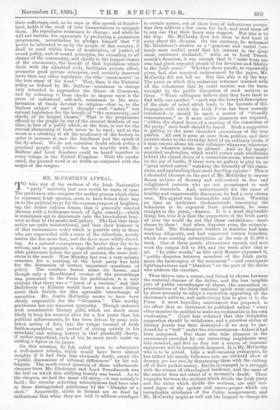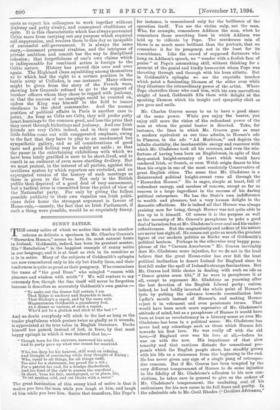MR. McCARTHY'S APPEAL.
TO take any of the sections of the Irish Nationalist " party " seriously just now would be waste of time. The gentlemen who compose the motley groups which claim to represent Irish opinion, seem to have forced their way on to the political stage for the express purpose of brighten- ing the rather tedious drama that is generally enacted thereon with a frolicsome touch of light comedy,—which is sometimes apt to degenerate into the knockabout busi- ness so dear to the music-hall gallery. The fact that their antics are quite unintentional, and that their humour is of that unconscious order which is possible only to those who are unprovided with a sense of the ridiculous, merely makes the fun more fast, and the farce more wildly divert- ing. As a natural consequence, the harder they try to be serious, and to maintain a dignified attitude as respon- sible politicians before the gaze of nations, the more ludi- crous is the result. Now Monday last was a very solemn occasion, for a meeting of the Irish party was held for the discussion of certain important questions of policy. The conclave lasted some six hours, and though only a Bowdlerised version of the proceedings was presented to the Press for publication, it is very evident that there was a "jewel of a ruction," and that Ballyhooly or Killaloe would have been a more fitting scene than Dublin for this agreeable interchange of amenities. Mr. Justin McCarthy seems to have been chiefly responsible for the " divarsion." This worthy gentleman has our sincerest sympathy. Though endowed with considerable literary gifts, which are much more likely to keep his memory alive for a few years than his political achievements, he has been driven by some mis- taken notion of duty into the vulgar turmoil of Irish faction-squabbles, and instead of sitting quietly in his armchair, and writing history in that pleasantly chatty, if rather superficial, style of his, he must needs insist on cutting a figure in its pages. On this occasion, he felt called upon to administer a well-meant rebuke, which would have been almost weighty if it had been less obviously futile, anent the "public discussions of internal differences" by his col- leagues. The much-vexed question of those unfortunate cheques from Mr. Gladstone and Lord Tweedmouth was the text on which this edifying homily was based. As to the cheques, we had the same old story,—it was nobody's fault ; the circular soliciting subscriptions had been sent to these distinguished politicians by the "blunder of a clerk." Apparently, clerks in Ireland are so fired by enthusiasm that when they are told to address envelopes to certain names, out of sheer love of industrious occupa- tion they address a few more for luck, and send them off to any one that their fancy may suggest. But this is by the way. Mr. McCarthy does not seem to feel hurt or sorry about the cheques. On the contrary, he welcomed Mr. Gladstone's missive as a "gracious and useful [cer- tainly most useful] proof that his interest in the great cause continues unabated ;" while as to Lord Tweed- mouth's donation, it was enough that it "came from one who had given repeated proofs of his devotion and fidelity to the Irish cause." Whether these proofs, so repeatedly given, had also required endorsement by the payee, Mr. McCarthy did not tell us. But this also is by the way. The point on which this audacious reformer insisted with all the vehemence that he could muster, was the harm wrought by the public discussion of such matters as these. "When colleagues believe that they have fault to find with one another "—such was the honeyed description of the state of mind which leads to the torrents of Bil- lingsgate with which the Irish Press has been recently inundated—it should be made a matter of "friendly remonstrance," or if more active measures are required, "within the closed doors of a meeting of the committee of the party," such fault should be found. Such a suggestion is galling to the most cherished convictions of the true patriot. All zest is gone at once from politics, and their pursuit sinks to the everyday level of an ordinary trade, if a man cannot abuse his own colleague whenever, wherever, and in whatever terms he pleases. And as for mealy- mouthed moderation, which would screen such ebullitions behind the closed doors of a committee-room, where would be the joy of battle, if there were no gallery to play to, no "great united nation" watching the dexterity of the cham- pions, and applauding their most dazzling ripostes ? This is a shameful attempt on the part of Mr. McCarthy to impose Saxon notions of decency and self-control on free and enlightened patriots who are not accustomed to such servile trammels. And, unfortunately for the cause of healthy and ungovernable discussion, he had a very strong case. His appeal was businesslike and direct. Wasting no time on irrelevant rhodomontade concerning the behaviour to be expected from gentlemen, he came straight to the point,—finance. It is a most deplorable thing, but true it is that the supporters of the Irish party all over the world do not like these exhibitions,—more shame to them ! And when disputes arise, the subscrip- tions fall. The Federation leaders in America had been working diligently, and had organised certain branches, which were sending subscriptions at the rate of $1,000 a week. One of these gentle altercations ensued, and next week the output fell to $10, and the week after that to nil. "In other words," as this mild. Mentor expressed it, "public disputes between members of the Irish party mean the bankruptcy of the movement "—and consequent lightheadedness and " blunders " on the part of the clerks who address the circulars.
Thus driven into a corner, and forced to choose between the material charms of the dollar, and the less tangible joys of public interchanges of abuse, the assembled re- presentatives of the Irish national spirit were compelled by stern necessity to adopt a resolution approving of the chairman's address, and authorising him to give it to the Press. A most beguiling amendment was proposed, to the effect that no statement be published unless "every other member be entitled to make an explanation in his own vindication." Cruel fate ordained that this delightful suggestion should be withdrawn, and a priceless string of literary jewels was thus destroyed—if we may be par- doned for a " bull " under the circumstances—before it had been composed. But those who take pleasure in the amusement provided by our interesting neighbours may take comfort, and feel no fear lest a source of innocent enjoyment will be henceforth dammed. It is Mr. McCarthy who is to be pitied. Like a well-meaning pedagogue, he has talked his unruly followers into an outward show of decency pro hac vice, by threatening them with the cutting off of their pocket-money. But he is engaged in a struggle with the stream of ethnological tendency, and the issue of the contest does not admit of a moment's doubt. These wrangles between the sections which divide the Irish party and the units which divide the sections, are only out- ward signs of the egoism and amour-propre which are ineradicable attributes of the Celtic temperament, and Mr. McCarthy might as well ask the leopard to change his spots as expect his colleagues to work together without jealousy and. petty rivalry, and consequent ebullitions of spite. It is this characteristic which has always prevented Celtic races from carrying out any purpose which required self-suppression, and renders them to this day so incapable of successful self-government. It is always the same story,—incessant personal rivalries, and the intrigues of private ambition and conceit bar the way to disciplined cohesion ; that forgetfulness of one's own claims which is indispensable for combined action is foreign to the Celtic nature. History has proved this over and over again. The Highland clans squabbling among themselves as to which had the right to a certain position in the battle array at Culloden, is one instance. Many others might be given from the story of the French wars, showing how Generals refused to go to the support of brother officers whom they chose to regard with jealousy, so that the success of no campaign could be counted on, unless the Icing was himself in the field to insure obedience to the chief commander. And the normal position of political affairs in Paris is another case in point. As long as Celts are Celts, they will prefer petty heart-burnings to the common good, and lose the prize that they covet through bickerings and jealousy. And our Irish friends are very Celtic indeed, and in their case these little foibles come out with exaggerated emphasis, owing to the fact that they have to play to an uneducated but sympathetic gallery, and so all considerations of good taste and good feeling may be safely sot aside ; so that the pause in the entertaining exhibitions with which we have been lately gratified is sure to be short-lived, and to result in an outburst of even more startling drollery. But we must protest, in the interest of all parties, against this invidious system by which reporters are excluded, and an expurgated version of the history of such meetings as these is given to the Press. Not only is the British public thus deprived of a good deal of racy amusement, but a tactical error is committed from the point of view of the Nationalist party. For only by giving the fullest possible publicity to their own vagaries can Irish politi- cians drive home the strongest argument in favour of Home-rule,—namely, the fact that an Irish Parliament, if such a thing were possible, would be so exquisitely funny.



















































 Previous page
Previous page